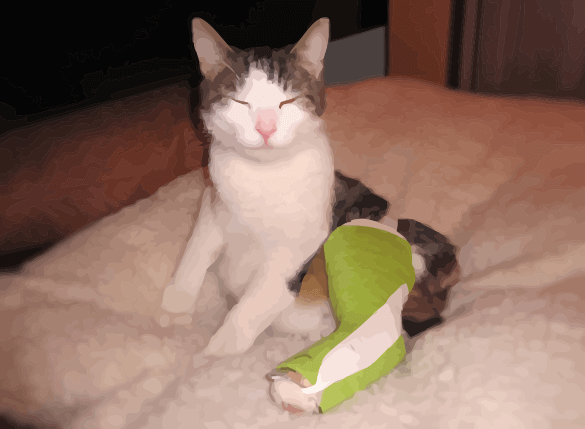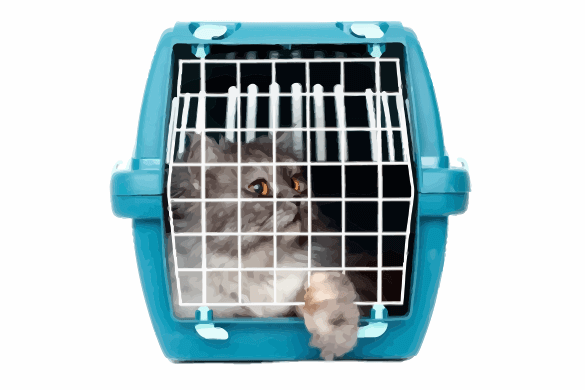Common Cat Injuries and Emergencies You Should Be Prepared to Deal With
Table of Contents
Cats can't really cheat death 9 times despite the popularity of the adage. In fact, cats are just prone to injury and medical emergencies as any other animal. Yes, they're strong, agile, possess quick reflexes, and they can land on their feet when they fall from a height, but ultimately they are still made of flesh and bone.
The worst part in dealing with animals that may need help is that they can't communicate to you what is wrong. However, most of the time they will give you warning signs that you should pay attention to.
Breathing Emergencies
Choking: A cat can get stuff stuck in its throat. This might happen with toys they play with or with small animals they're consuming. If you notice your cat changing color, not being able to make noise, or otherwise having trouble breathing you must act quickly. You need to squeeze their abdomen with quick thrusts to try and force air out so the obstruction will become dislodged. Get your cat to the vet as soon as possible even if you dislodge the object as there may be damage to their throat or their abdomen.
Throat Injuries: Although it's quite rare, cats can suffer injuries to their throat, perhaps from a fight. This injury can possibly cause swelling which can lead to breathing problems. The best thing you can do is get your cat to the vet ASAP.
Swelling can also result from an allergic reaction. If your cat is exposed to various chemicals, medicines, or even some foods they may suffer a reaction which can close the airway. In such cases, remove your cat from the source of the allergy and get to the vet ASAP.

Broken Bones
By twisting their body while falling through the air cats can usually land on their feet. It's a unique ability. However, they're still technically hitting the ground and can still get injured. Landing on their feet does not negate the effects of gravity. If the height is sufficient they can break their legs or even suffer internal injuries.
The warning signs of broken bones can include: deformity of a limb, the inability to walk or stand, sounds of crying from pain, and sometimes the broken bone protruding through the skin. Do not try to reset the bone or to massage the area. Gently put your cat in its cage and see a vet right away.
Bleeding
Internal
Internal bleeding can happen when blood vessels break and blood escapes, but the skin remains intact. Being hit by a blunt object is the most common cause e.g. a vehicle. If your cat gets hit, even if they appear fine, they need to be taken to the vet. Look for signs of pain, an inability to walk properly, or vomit with blood. Sometimes the warning signs of internal bleeding don't appear right away.
External
When blood vessels break and the skin is also broken, there's external bleeding. If it's just a little scratch, clean the area with antiseptic. For the next few days watch for signs of the cut becoming infected and visit the vet if you think it has gotten worse. If it is a major bleed, get a sterile gauze and apply pressure over the wound for several minutes. This will help stop the bleeding. As usual, check in with a vet as soon as you can.
If there is a foreign object embedded in the tissue do not remove it. By removing it you might make the injury worse so let a vet take care of it.
Poisoning
Cats are quite good at avoiding foods or chemicals that are harmful. However, poisoning can still happen by accident (e.g. from consuming a poisonous plant) or by someone that wants to do harm. If you see your cat vomiting or appearing dizzy, you need to get them to the vet. If possible, take the substance they were consuming with you. Don't leave the poison around for other animals to consume.
In your home make sure you keep all cleaning containers in a closed cupboard. Don't use insect or bug killing chemicals and if you have plants make sure they are not poisonous to cats. Some of the most common houseplants aren't safe for cats.

Heat
Unlike humans, cats have trouble getting rid of excess heat. As humans we sweat, which is a very efficient method of getting rid of heat. Cats get rid of heat through breathing and panting. You may have seen a cat with their tongue hanging out of their mouth while breathing hard which is their way of getting rid of heat. However, this method has limits and the cat can overheat in hot environments. This will happen more quickly if the cat has a lot of fur and if the weather is humid.
Take your cat to a cooler area immediately and give them some water to drink. If they do not recover in a few minutes they need medical help. If they can't stand, they are vomiting, or they won't drink, it may be that their condition has progressed too far and you need to seek the help of a professional
Cold
Although cats have fur, sometimes thick fur, they can still get cold. Any time a cat's body can't create enough heat to keep up with what is lost through natural methods, they can suffer a cold emergency. Get your cat inside and warm them up with your body heat or with a blanket. Do not give them any food or drink until they have recovered better.
Foreign Little Critters
If you have an indoor cat, you shouldn't have to worry about these pests. However, if your cat goes outside they can get bitten by mosquitoes, or infected by ticks or fleas. Mosquitoes are usually just a nuisance. However, ticks can cause infection via bacteria. Even if you remove the tick you should still take your cat to a vet for further investigation.
Fleas are also a problem because once they lay eggs in the cat's fur they are difficult to get rid of. You will need to get special medicine from your vet. Be aware that ticks and fleas can spread to other pets. Although fleas can't live on humans, ticks can jump from your pet to you and make a nice home on your skin without you even knowing it because they can be hard to spot.

Transportation Safety
Even when transporting your cat during an emergency you need to consider your safety. If driving your cat, make sure he is always in a secured cage and in the back seat with a seat belt strap. Never drive in a way that could result in you being distracted. Do not speed or drive recklessly. In many countries it is the law that the pet be secured in a cage and not free to roam around in the car.
839GYLCCC1992



Leave a Reply